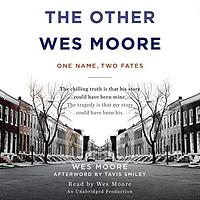Take a photo of a barcode or cover
informative
reflective
slow-paced
Wes Moore and Other Wes Moore grew up in the same rough Bronx neighborhood. Wes Moore started to go down the wrong path but his educated mother and tough-lovin' Jamaican grandparents sent him to military school, where he underwent a radical transformation and became the charismatic overachiever he is today. Other Wes Moore's downward spiral continued uninterrupted and he ended up impregnating two different women with four different babies before the age of 20, getting arrested several times on drug charges, and ultimately being imprisoned for his involvement in a jewelry story robbery and the murder of a cop.
Wes Moore is a likable narrator, and you are happy he is able to pull himself up by his bootstraps. Other Wes Moore is a likable villain, and you sort of feel bad he has to spend the rest of his life in prison. (But you feel worse for the widow and kids of the man he helped kill, of course.)
The whole point of this book is that mentorship is important in the fight to save our inner city youth. It all makes sense, and the parallel trajectory of Wes and Wes' lives is interesting (and I learned what a "dap" is!), but I found myself wondering why this wasn't just covered in an in-depth Atlantic article.
Wes Moore is a likable narrator, and you are happy he is able to pull himself up by his bootstraps. Other Wes Moore is a likable villain, and you sort of feel bad he has to spend the rest of his life in prison. (But you feel worse for the widow and kids of the man he helped kill, of course.)
The whole point of this book is that mentorship is important in the fight to save our inner city youth. It all makes sense, and the parallel trajectory of Wes and Wes' lives is interesting (and I learned what a "dap" is!), but I found myself wondering why this wasn't just covered in an in-depth Atlantic article.
adventurous
challenging
dark
emotional
hopeful
informative
fast-paced
reflective
medium-paced
emotional
hopeful
reflective
medium-paced
informative
slow-paced
dark
emotional
hopeful
informative
inspiring
reflective
sad
fast-paced
I really liked this book. My only real complaint is that it’s not longer. Wes Moore paints a picture of his life and the other Wes Moore’s life through stories along a similar timeline in both men’s lives. There isn’t much to the book aside from the stories and Moore lets the reader draw their own conclusions. In the afterwords, he mentions this. That he didn’t want to answer the question of what was the difference between the two of them. While a more analytical approach would have been nice, that’s not really what this book is about. It’s about telling the story of two men and how deeply choices, and circumstances, can affect a person’s life.
The book is written in plain language, so is very easy and quick to read. I loved the juxtaposition of each chapter being a pivotal year in the men’s lives as well as having back to back stories rotating between each man.
Highly recommend this as a quick and informative read.
The book is written in plain language, so is very easy and quick to read. I loved the juxtaposition of each chapter being a pivotal year in the men’s lives as well as having back to back stories rotating between each man.
Highly recommend this as a quick and informative read.
Such an incredibly disappointing read. I finally picked it up after having it sit on my bookshelf for a few years, and would encourage anyone who reads this book to think critically about the message. While the book started off engaging and as if it were building towards some revelations about race in America and the failures of the justice system, it ended as one long pat on the back for Wes Moore, the author, and completely erased the tragedy that is Wes Moore, the man serving a life sentence in prison. I kept hoping that in the last twenty pages of the book that the author would start speaking towards the injustices Wes Moore faced, with a resounding call to action. Whether or not Wes Moore is innocent of the crime he committed, as he maintains he is, why was the fact that he maintained his innocence completely glossed over? Where was the authors call for justice in the absurd sentencing of life in prison without parole for simply being an accomplice? All while the author glorifies his experience fighting in Afghanistan, conducting “lethal operations,” as if that gives him a moral or ethical superiority over the other Wes Moore, who was, again, an accomplice in a robbery. The Judicial system failed Wes Moore. This book failed Wes Moore. What a terrible tragedy to have his life exploited by an author who uses what could have been valuable pages to advocate for this man in prison (someone who very obviously has never had someone advocate for him), to brag about going to a church in South Korea. The Other Wes Moore has been failed by an inherently corrupt and racist system, and not one sentence drew attention to that. For the author to say he will never know exactly what happened to make their lives so different is shameful. Has this author so little empathy? So little regard for a black man spending the rest of his life in prison, all so that Wes Moore can add “author” to his resume? What a devastation to not use the ending to call for a shorter sentence, parole, or justice for Wes Moore. Spend your time and money on a book that advocates for prisoners, and for a serious change.






